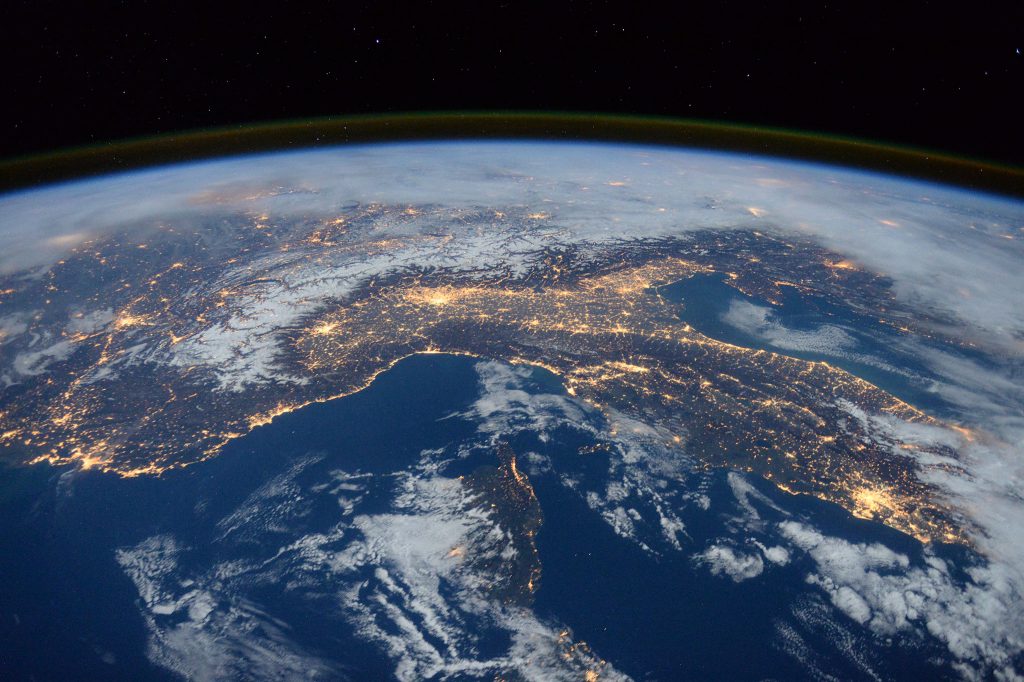

It has always been a dream for many to view the Earth from the vastness of space. During the day, to see the beauty of Earth’s landscape, riddled with oceans, mountains, and valleys. As night falls, to take in the captivating city lights from the human landscape as they twinkle across the planet. There are some virtual reality applications in existence that can provide a partial experience of this observation, but can’t compete visually in comparison.
According to Psychology In Action, many astronauts have reported when they looked down on the Earth, they experienced radical shifts in consciousness, some of which can feel deeply emotional and promote a sense of connectedness with the Earth and with one another. Termed “the overview effect” by one author, White (1987)1, who described this effect as “a profound reaction to viewing the earth from outside its atmosphere.” This overview effect has been described by many astronauts as one of the most meaningful moments of their lives.


It is no wonder that many companies are trying to build rockets to take space tourists on a momentous trip of a lifetime. Companies such as Space Adventures hopes to bring tourists to a trip around the moon, at a hefty $150 million a seat.
Or, for a little less, you can experience suborbital flight, zero-gravity and all, at a fraction of the cost with Virgin Galactic. It costs $250,000 beginning with three days of flight training, a two and a half hour flight with a view of Earth, and congratulatory champagne at the end.
As you noticed, with the cost of even the most inexpensive tickets running into hundreds of thousands of dollars, it seems likely that this type of experience is something we mostly will never encounter.
Now, two UK-based companies have decided to collaborate and offer as close of an experience as the real thing to anyone.
Immersive content studio Rewind, and space industry experts, In-Space Missions, have launched a company called SpaceTime Enterprises. Their goal is to launch multiple satellites into Earth’s orbit, which will broadcast real-time video of the entire planet. The only thing you’ll need to experience this, is a virtual reality headset.
Their plan is to allow virtual reality users to get an entire view of the Earth at the highest possible resolution, for spectacular views, but also for use in education and research.
The first satellite launch is scheduled for September of 2019, and will carry with it, the cameras that will deliver these breathtaking images of Earth. As they continue to launch more satellites, this will further increase its database, and will hope to offer views of anywhere on Earth in real time. All through the power of virtual reality immersion.
Earth observation has been one of the main uses of satellites during the space age, and SpaceTime can collect all of this data to take scientific measurements and push forward plans of action, especially surrounding areas of climate change.
Given the potential of having such views of Earth, other virtual reality companies are spinning up to do similar feats, or helping to curate this virtual reality content.
SpaceVR of San Francisco, has already launched their first test satellite, Overview 1, to the International Space Station. This satellite uses 4K sensors to capture 360º, high resolution video from space, viewable from any virtual reality headset via subscription based model.
Earth-i, a company based in the UK, is also building a network of satellites to provide high-resolution imagery of Earth. Their test satellite, VividX2, was launched earlier this year, posting its first color videos from space, which shows aircraft taxiing on runways and cars driving on highways.
Though not a virtual reality company, their content can be leveraged for the development of tools and applications that come from high-frequency, high-resolution images, and video data.
What used to be a privileged view for astronauts only, can now lead to making these widely captivating views for anyone. We’ll see if the overview effect can be replicated by virtual reality alone as the potential for this technology is extraordinary.
1. White, F. (1987). The overview effect: Space exploration and human evolution. Boston: Houghton Mifflin.
Virtual reality creates safe and immersive environments that help police officers hone their skills, equipping them with new ways to…
YOGES has an innovative take on adapters for Quest 2 controllers, including a unique removable piece that turns both controllers…
Live XR theater started during the pandemic, but it’s more than a way to avoid a crowd. The medium allows…
Applying real-world laws to XR spaces will require governments, businesses, and institutions to work together for effective regulation.
Alien Invasion AR FPS does a lot with relatively little as it hooks me into the story through a combination…
AI is like any tool - it makes the job easier but only if you know how to use it.…